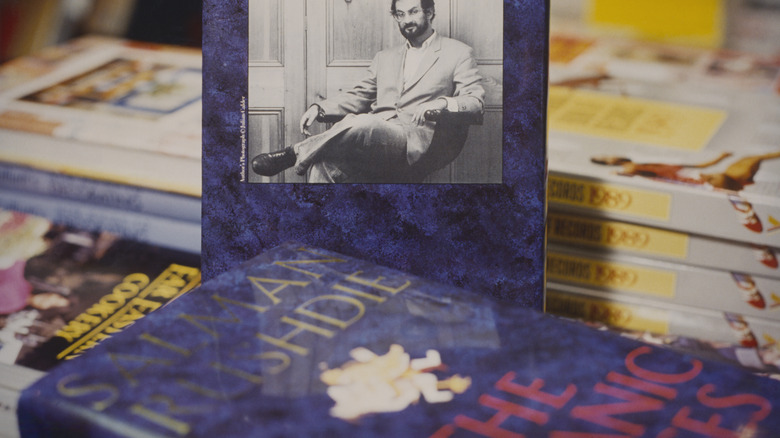Salman Rushdie's Connection To The Tragic 1991 Murder Of A Japanese Scholar
AP News reports that controversial author Salman Rushdie was attacked by an unknown assailant during a lecture in Chautauqua, New York. The report states that it's believed that the 75-year-old was stabbed at least once in the neck. Per The Guardian, the suspect is now in custody, and Rushdie was transported to a nearby hospital. His condition, however, remains unknown. According to the BBC, death threats are nothing new to Rushdie. In 1988, he released "The Satanic Verses," a novel that led the Indian-born British-raised author to go into hiding. Britannica explains that "The Satanic Verses" openly calls into question Islam and its teachings.
This did not fare well for Rushdie. Although the book was a best-seller, the BBC writes that several countries banned it, including India, Pakistan, and Iran. In fact, Iran banned the book the same year it was published (via USA Today). In 1989, Iran's leader, Ayatollah Ruhollah Khomeini, issued a fatwa, or edict — a death sentence for Rushdie for writing what what the Ayatollah considered to be sacrilegious literature (per Amnesty International). Iranian religious organizations later offered millions to anyone who killed Rushdie. NPR states that Rushdie went into hiding for nine years under the protection of the British government. However, the death threats for "The Satanic Verses" went beyond its author; it also applied to the novel's translators (via iNews).
Hitoshi Igarashi's death remains unsolved
Although Rushdie was afforded protection 24/7, iNews writes that his Japanese translator, Hitoshi Igarashi, was not as fortunate. The New York Times reported that on July 11, 1991, the 44-year-old was stabbed to death outside of his office at Tsukuba University, near Tokyo. The translator was also an assistant professor of comparative culture. A janitor found his body, which was riddled with stab wounds to his neck, face, and hands. Igarashi had studied in Iran prior to the 1979 downfall of the shah. Besides translating "The Satanic Verses," he wrote "The Islamic Renaissance" and "Medicine and Wisdom of the East," both of which were books on Islam.
According to The Washington Post, Rushdie stated that he was "extremely distressed" by the murder. As there was a briefcase of money found next to Igarashi, investigators surmised that his death was likely connected to his translation of "The Satanic Verses." Nevertheless, Japanese officials noted that they were unsure what the motive for Igarashi's murder was. The publication also revealed that Igarashi did have protection, but only briefly after the novel's translation was published. Per The Daily Beast, his murder remains unsolved. Even so, the Abdorrahman Boroumand Center believes that the Iranian government is to blame for Igarashi's death.
Another translator was also attacked
The New York Times states that only days before Igarashi's murder, Ettore Capriolo, the Italian translator of "The Satanic Verses," was attacked and stabbed in Milan. Capriolo, however, survived. Per The Washington Post, his assailant was an Iranian national who had previously asked Capriolo for Rushdie's address. In light of the attacks, Japanese investigators encouraged Gianni Palma, the publisher of the Japanese translation of "The Satanic Verses," to go into hiding. Previously, Palma had been attacked in 1990 when he and Igarashi held a press conference to announce that they were planning to translate the novel into Japanese. That assailant was promptly arrested.
Regarding Igarashi's murder, Palma stated, "All I can say is that the professor was probably an easier target than I am." He added, "After all, they have already attacked me here, and I have been taking precautions" (via The Washington Post). Amnesty International reports that in 1993, William Nygaard, the novel's Norwegian publisher, was shot three times outside of his Oslo home. He too survived the attack. In 2018, 25 years after the attack, charges were filed against the unnamed attackers (per the CBC).
Another article from The Washington Post explains that Turkish writer Aziz Nesin was nearly killed after publishing translated excerpts of "The Satanic Verses" in a local magazine. Instead, the Independent writes, a mob set a hotel on fire, killing 40 and injuring Nesin. Nesin was saved and only suffered minor injuries. The BBC writes that since 1998, Iran no longer formally backs the fatwa against Rushdie. In 2012, he published "Joseph Anton," a memoir about his time in hiding.


